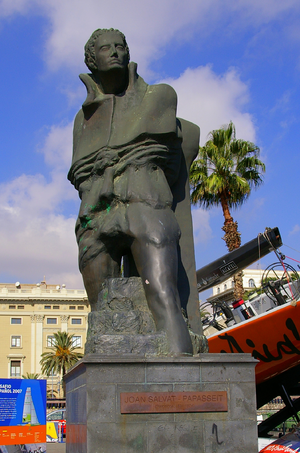Joan Salvat-Papasseit facts for kids
Quick facts for kids
Joan Salvat-Papasseit
|
|
|---|---|

Sculpture at the Barcelona seafront
|
|
| Born | 16 May 1894 Barcelona, Catalonia, Spain |
| Died | 7 August 1924 (aged 30) Barcelona, Catalonia, Spain |
| Resting place | Cemetery of Montjuïc |
| Occupation | Poet, |
| Literary movement | Surrealism, Futurism |
Joan Salvat-Papasseit (born in Barcelona, 16 May 1894 – died 7 August 1924) was a famous Catalan poet. He also wrote many articles and other texts about social and political ideas. He mostly wrote in the Catalan language. However, when he first started writing, he wrote some essays in Spanish.
Joan Salvat-Papasseit's writing style was very unique and didn't follow old rules. He was full of idealism, which means he believed in making the world a better place. Sadly, his poems often hinted that he would die young. His poetry mixed new, experimental ideas (called avant-garde) with more traditional styles. His first book of poems, Poemes en ondes hertzianes (Poems in Hertzian Waves), came out in 1919. A famous artist named Joaquín Torres García drew the cover for this book. Other important poetry books he wrote include "La gesta dels estels" (The Exploit of the Stars) in 1922 and "El poema de la rosa als llavis" (Poem of the Rose in the Lips) in 1923.
The city of Barcelona has a special statue honoring Joan Salvat-Papasseit. It is located at the Moll de la Fusta wharf. The statue was created by Robert Krier. On the statue's base, there is a plaque with lines from his poem "Nocturn per a acordió." This poem is about the time he worked as a night watchman there. Many musicians have turned his poems into songs, helping more people discover his work. Some of these artists include Lluís Llach, Ovidi Montllor, and Joan Manuel Serrat.
Contents
Joan Salvat-Papasseit's Writings
Joan Salvat-Papasseit wrote many different kinds of texts during his life. He is best known for his poetry, but he also wrote essays and important statements called manifestos.
His Poetry Books
- Poemes en ondes hertzianes (Poems in Hertzian Waves, 1919)
- L'irradiador del Port i les gavines (The Port Irradiator and the Seagulls, 1921)
- Les conspiracions (The Conspiracies, 1922)
- La gesta dels estels (The Exploit of the Stars, 1922)
- El poema de la rosa als llavis (Poem of the Rose in the Lips, 1923)
- Óssa Menor (Ursa Minor, 1925, published after he died)
Essays and Articles
Joan Salvat-Papasseit also wrote many essays and articles. These often shared his thoughts on society and philosophy.
- Glosas de un socialista (1916)
- Humo de fábrica (1918)
- Mots propis (1917–1919), a series of essays published in a magazine he helped start.
- La ploma d'Aristarc, which was never published.
Important Statements (Manifestos)
He wrote several manifestos, which are public declarations of his ideas and plans.
- Sóc jo que parlo als joves (I Am the One Who Speaks to the Young, 1919)
- Concepte de poeta (Concept of a Poet, 1919)
- Contra els poetes amb minúscula: primer manifest català futurista (Against Poets with Lowercase Letters: First Catalan Futurist Manifesto, 1920)
Magazines He Started
Joan Salvat-Papasseit also helped create and publish several literary magazines. These magazines were important for sharing new ideas and writings.
- Un Enemic del Poble (An Enemy of the People, 1917–1919)
- Arc-Voltaïc (1918)
- Proa (Bow, 1921)
See also

- In Spanish: Joan Salvat-Papasseit para niños
 | Mary Eliza Mahoney |
 | Susie King Taylor |
 | Ida Gray |
 | Eliza Ann Grier |

